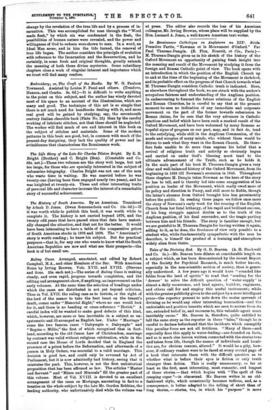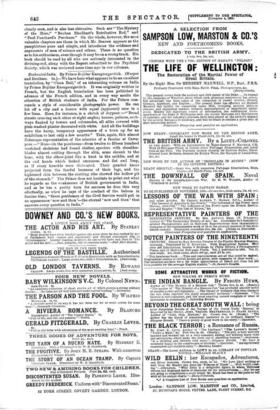Tales of the Divining Rod. By G. D. Beaven. (A.
H. Stockwell and Co. 5s.)—Mr. Beaven here dilates at considerable length on a subject which, as has been demonstrated by the recent Report of the Society for Psychical Research, is much better known, especially in the non-scientific section of society, than is gener- ally understood. A few years ago it would have " sounded like fables from the land of spirits" to read that "sending for the ' dowser' to solve the difficult question of • water supply ' is almost a daily occurrence, and land agents, builders, engineers, and others call for and employ this useful instrument ; while with the greater publicity given to the subject by a more intelligent press—the reporter present to note down the modes operandi of divining as he would any other interesting transaction--and the undeniable and positive benefits which are seen to accrue from its use, extended belief in, and recourse to, this valuable agent must inevitably ensue." Mr. Beaven is, therefore, quite entitlei to tell the same story as the reporter in these "tales," though he is careful to declare beforehand that the incidents which exemplify this peculiar force are not all fictitious. " Many of them—and especially does this apply to water-finding—are founded on facts, and so is much else herein written connected with the stories true and taken from life, though the names of individuals and locali- ties are, for obvious reasons, altered." It would be a pity, how- ever, if ordinary readers were to be faced at every second page of a book that interests them with the difficult question as to whether what is before their eyes is fiction or only truth stranger than fiction. This is really unnecessary, so far at least as the first, most interesting, most romantic, and longest of these stories — that which begins with " The spell of the creeping copse "—is concerned. Mr. Beaven writes in an old- fashioned style, which occasionally becomes tedious, and, as a consequence, is better adapted to the telling of short than of long genies, — stories, too, in which his " purpose " is more clearly seen, and is also less obtrusive. Such are "The Mystery of the Mere," " Reuben Rhodhart's Retributive Rod," and "Paul Fanchard's Purchase." On the whole, however, the most valuable chapters are those in which Mr. Beaven appears as the pamphleteer pure and simple, and introduces the evidence and arguments of men of science and others. There is no question as to his enthusiasm, even though it may be on a wrong track. His book should be read by all who are seriously interested in the divining-rod, along with the Report submitted to the Psychical Society, which was reviewed some time ago in our columns.























































 Previous page
Previous page